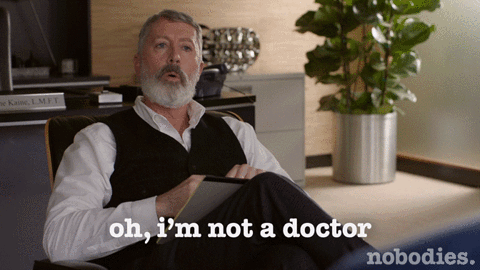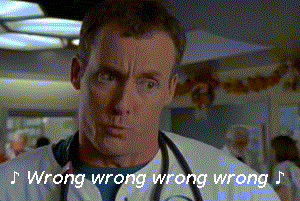
Life

Share
23rd August 2017
09:20am BST

 Do you imagine that every sniffle is a sign that you're getting pneumonia? Then you really shouldn’t look up stuff on the web. A symptom checker would have you thinking that a simple headache is being caused by hypoparathyroidism, mumps or a brain tumour. We don’t even know what hypoparathyroidism is but it sounds bloody terrifying.
Do you imagine that every sniffle is a sign that you're getting pneumonia? Then you really shouldn’t look up stuff on the web. A symptom checker would have you thinking that a simple headache is being caused by hypoparathyroidism, mumps or a brain tumour. We don’t even know what hypoparathyroidism is but it sounds bloody terrifying.
 The quality and reliability of websites can vary greatly. A symptom checker might look very high tech and professional but it may be the symptom checker equivalent of Bing. Would you trust Bing to tell you what was wrong with you?
The quality and reliability of websites can vary greatly. A symptom checker might look very high tech and professional but it may be the symptom checker equivalent of Bing. Would you trust Bing to tell you what was wrong with you?
 The internet is a wealth of contradictions wrapped in an argument and garnished with conflicting opinions. Basically, there’s a lot of stuff out there and it’s hard to know what’s right and wrong. If you are feeling sick, it’s easy to find yourself disappearing down a rabbit hole of exaggerations, unqualified opinions and alarmist advice on forums.
The internet is a wealth of contradictions wrapped in an argument and garnished with conflicting opinions. Basically, there’s a lot of stuff out there and it’s hard to know what’s right and wrong. If you are feeling sick, it’s easy to find yourself disappearing down a rabbit hole of exaggerations, unqualified opinions and alarmist advice on forums.
 You’ve entered your symptoms into a couple of different symptom checkers and got the same results. You read up on the disease and convince yourself that this must be what you have. Before you know it, you’re telling all your friends and family that you’ve got a weak kidney on the basis of nothing more than a five-minute web search.
You’ve entered your symptoms into a couple of different symptom checkers and got the same results. You read up on the disease and convince yourself that this must be what you have. Before you know it, you’re telling all your friends and family that you’ve got a weak kidney on the basis of nothing more than a five-minute web search.
 Symptoms tend to reflect that fact that something is wrong. Assuming that you know what’s wrong with you can delay a much-needed trip to the doctor. Sometimes, a short delay in seeking professional help could end up having some pretty dire consequences.
Symptoms tend to reflect that fact that something is wrong. Assuming that you know what’s wrong with you can delay a much-needed trip to the doctor. Sometimes, a short delay in seeking professional help could end up having some pretty dire consequences.
 There are some sites out there offering dangerous advice to vulnerable people. Now they may believe that taking some herbal tea will cure severe diseases but they clearly know nothing about medicine. The people behind these sites may not be malicious but they can certainly be dangerous if you follow their advice.
There are some sites out there offering dangerous advice to vulnerable people. Now they may believe that taking some herbal tea will cure severe diseases but they clearly know nothing about medicine. The people behind these sites may not be malicious but they can certainly be dangerous if you follow their advice.
 Do you know any doctors? Do you know how long they went to college for? They weren’t there for the parties or the student discounts in shops. Medicine is tricky! It’s all about assessing a patient and knowing what possibilities to consider and which ones to discount. Yet people still insist on taking a medical diagnosis from a glorified personality quiz.
The great thing about Irish Life Health's Digital Doctor is that you're actually chatting to a real GP, who you can access from home, from work or even when you're abroad. It's available to all new and renewing Irish Life Health members so you'll never have to place your faith in Dr. Google again!
Irish Life Health dac is regulated by the Central Bank of Ireland.
Brought to you by Irish Life Health.
Do you know any doctors? Do you know how long they went to college for? They weren’t there for the parties or the student discounts in shops. Medicine is tricky! It’s all about assessing a patient and knowing what possibilities to consider and which ones to discount. Yet people still insist on taking a medical diagnosis from a glorified personality quiz.
The great thing about Irish Life Health's Digital Doctor is that you're actually chatting to a real GP, who you can access from home, from work or even when you're abroad. It's available to all new and renewing Irish Life Health members so you'll never have to place your faith in Dr. Google again!
Irish Life Health dac is regulated by the Central Bank of Ireland.
Brought to you by Irish Life Health.
Life
life style